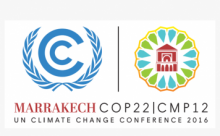Kenya’s single largest private investment in history is the Lake Turkana Wind Power Project (LTWP)—the largest wind farm on the continent. Quantifying the direct and indirect benefits of this project is challenging, but also critical to understanding how low emission development strategies (LEDS) can help countries achieve national development objectives beyond greenhouse gas mitigation—such as energy security, job creation, and improved human health.
USAID’s Global Climate Change Office and its Resources to Advance LEDS Implementation (RALI) Project, implemented by ICF, in partnership with the LEDS Global Partnership (GP), has released a case study analyzing the benefits of LTWP, which provides important lessons for maximizing social, environmental and economic returns for other large wind projects in the region and beyond.
The LTWP, expected to be complete in July 2017, will add 310 MW of wind power capacity to Kenya’s national grid through the installation of 365 turbines, construction of 436 kilometers (km) of transmission lines, and rehabilitation of more than 200 km of existing roads. The project covers a remote area of 162 km2, which is home to a population of roughly 1,000 nomadic pastoralists.




